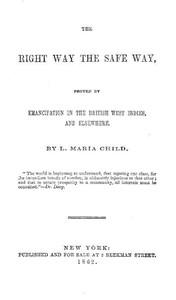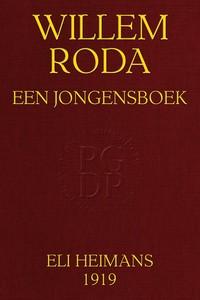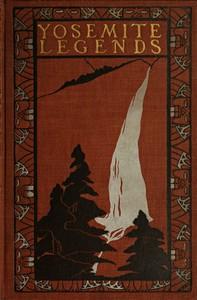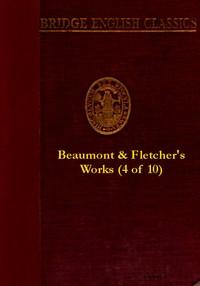Read this ebook for free! No credit card needed, absolutely nothing to pay.
Words: 38685 in 7 pages
This is an ebook sharing website. You can read the uploaded ebooks for free here. No credit cards needed, nothing to pay. If you want to own a digital copy of the ebook, or want to read offline with your favorite ebook-reader, then you can choose to buy and download the ebook.


: The Right Way the Safe Way Proved by Emancipation in the British West Indies and Elsewhere by Child Lydia Maria Adapter - Slavery United States; Slavery West Indies
"Dr. Ferguson, of St. John's called on us. He is a Member of Assembly, and one of the first physicians on the island. He said it had always appeared to him that if a man is peaceable while he is a slave, he would certainly be so when he was a freeman. But though he had anticipated beneficial results from the abolition of slavery, the reality had exceeded his most sanguine expectations. Had it not been for the unprecedented drought, the island would now be in a state of prosperity unequalled in any period of its history. The mercantile business of the town had increased astonishingly. He thought stores and shops had multiplied in a ratio of ten to one. Mechanical pursuits were likewise in a flourishing condition. A general spirit of enterprise was pervading the island. The streets and roads, in town and county, were much improved. The moral character of the white population was brightening; one proof of it was that the old custom of concubinage was becoming disreputable. Emancipation was working admirably; especially for the planters. The credit of the island had decidedly improved. Immediate freedom was infinitely better policy than slavery, or the apprenticeship either.
"Dr. Daniell, manager of the Weatherill estate, has long been a resident of Antigua, and is thoroughly acquainted with its internal policy. He is a Member of the Council, owns an estate, manages another, and is attorney for six. Being a prominent member of one branch of the body which gave immediate emancipation to the slaves, his testimony is entitled to great weight. He said, 'We all violently resisted abolition, when it began to be agitated in England. We regarded it as an outrageous interference with our property and our rights. But now we are rejoiced that slavery is abolished.' He did not think the system of apprenticeship had any tendency to prepare the slaves for freedom. The arbitrary control of a master could never be a preparation for freedom. Sound, wholesome legal restraints were the only preparation. Apprenticeship vexed and harrassed the negroes, and kept them in a state of suspense. The reflection that they had been cheated out of their expected liberty six years would sour their minds; and when they at last obtained freedom, they would be less likely to be grateful. The planters in Antigua had secured the attachment of their people by conferring upon them immediate emancipation. There had been no deficiency of labor. Estates throughout the island were never in more advanced condition. Nothing was wanted but rain. He frequently employed his people by the job, for short periods, and always with gratifying results. The negroes accomplished twice as much as when they worked for daily wages, because they made more money. On some days they made three shillings; three times the ordinary wages. He managed them altogether by mildness, and found it extremely easy. He had quite as much influence over them, as he ever had during slavery. But where managers persisted in habits of arbitrary command, they failed. He had been obliged to discharge a manager from one of his estates, on account of his overbearing disposition. If he had not dismissed him, the people would have abandoned the estate. Love of home was such a passion with negroes, that nothing but bad treatment could force them away. He did not know of more than one or two planters on the whole island, who did not consider emancipation a decided advantage to all parties.
"David Cranstoun, Esq., manager of Athill's estate, and a magistrate, said to us: 'I get my work done better than formerly, and with incomparably more cheerfulness. I employ fewer laborers, but my estate was never in a finer state of cultivation. My people are always ready and willing to work. I occasionally employ them at jobs, and always with great success. When I give out a job, it is accomplished in half the time it would have taken, if paid by the day. On such occasions, I have known them turn out before three o'clock in the morning, and work by moonlight: and when the moon was not shining, they sometimes kindled fires among the dry cane leaves to work by. They would continue working all day, till four o'clock; stopping only for breakfast, and dispensing with the usual intermission from twelve to two. During slavery, the weekly expenses on the estate averaged ?45 . After emancipation, they averaged ?20 . The negroes are a remarkably temperate people. I have rarely seen one intoxicated. We have no cause to fear insurrections now. Emancipation has freed us from all danger on that score. Among the advantages of the present system is the greater facility of managing estates. It saves us from a world of trouble and perplexity. I have found that the negroes are easily controlled by law; more so, perhaps, than the laboring classes in other countries. I do not know of a single planter, who would be willing to have slavery restored. We feel that it was a great curse; a curse to the planter, as well as the slave.'
"We breakfasted at the Villa estate, within half a mile of St. John's. We found the manager less sanguine in his views of emancipation, than the planters generally were. This is easily accounted for. The estate is situated so near the seaport town, that his people have many temptations to leave their work, from which those on more distant estates are exempt. He admitted, however, that the danger of insurrection was removed, that crime was lessened, and the moral condition of society rapidly improving.
"Ralph Higinbotham, Esq., U. S. Consul at Antigua, in 1837, bore the following testimony: 'The general conduct of the negroes has been worthy of much praise; especially considering the sudden transition from slavery to unrestricted freedom. Their demeanor is peaceable and orderly. Whatever may have been the dissatisfaction of the planters at the commencement of the present system, they are now well satisfied that their properties are better worked, and their laborers more contented and cheerful, than in the time of slavery.'"
Some difficulties always attend every change in the structure of society; but if the change is based on true principles, the difficulties are always temporary. They are like a stony pathway from a cavern into sunlight. So it proved in Antigua. Mr. James Scotland, the venerable merchant already alluded to, said to Mr. Thome: "The troubles attending emancipation resulted almost entirely from the perseverance of the planters in their old habits of dominion. Their pride was wounded by seeing their slaves elevated to equal rights, and they were jealous lest they should aspire to be on the same footing in all respects. In the early stage of freedom, they frequently used their power as employers to the annoyance and injury of their laborers. For the slightest misconduct, and sometimes without any reason whatever, the poor negroes were dragged before magistrates , mulcted in their wages, fined otherwise, and committed to jail, or the house of correction. Yet those harrassed people remained patient, orderly, and submissive. Their treatment has now much improved; for the planters have happily discovered that they sacrificed their own interests by keeping the cultivators of their lands in agitation and suffering."
TESTIMONY OF MAGISTRATES AND TEACHERS, IN ANTIGUA, IN 1837.
Mr. Thome says: "The governor spoke to us unreservedly of the past and present condition of Antigua, and stated various particulars in which the Colony had been greatly improved by emancipation. He said planters from every part of the island assured him that the negroes were industriously disposed. They all conceded that emancipation had proved a blessing to the island, and he did not know a single individual who wished to return to the old system. He said that, during the recent Christmas holidays, the Police Reports did not return a single case of arrest. He had been acquainted with the country districts in England, and travelled extensively in Europe; and he had never yet found such a peaceable, orderly, law-abiding peasantry, as those of Antigua. The great crime of the island, and indeed, of all the West India Colonies, had been licentiousness; but they were certainly fast improving in that particular.
"Teachers, missionaries, clergymen, and planters, uniformly testified that the negroes were as capable of receiving instruction as any people in the world; and it was confirmed beyond all doubt by facts we ourselves witnessed. We were happy to learn that the emancipated negroes manifested great anxiety for the education of their children. They encouraged them to go to school, and labored to support them, though they had strong temptation to detain them at home to work. They also contributed a small weekly sum for the maintenance of schools."
Concerning the moral condition of Antigua, Mr. Thome furnishes a quantity of Police Reports, from which I quote the following, as fair samples of the whole: "St. John's, Sept. 1835. Capital offences have much decreased in number, as well as all minor ones. The principal crimes lately submitted for the investigation of the magistrates seem to consist chiefly in trifling offences, and breaches of contract.
"Oct. 1835. Although instances do occur of breaches of contract, they are not very frequent; and, in many cases, I have been induced to believe that the offence has originated more in want of a proper understanding of the time, intent, and meaning of the contract into which the laborers have entered, than from the actual existence of any dissatisfaction on their part.
"Jan. 1836. At this period, when several successive days of idleness occur among the laboring classes, I cannot but congratulate your Honor on the quiet demeanor and general good order, which has happily been maintained throughout the island. During the holidays I had only one prisoner committed to my charge, and his offence was of a minor nature.
Free books android app tbrJar TBR JAR Read Free books online gutenberg
More posts by @FreeBooks

: Willem Roda: Een jongensboek by Heimans Eli Braakensiek Joh Johan Coenraad Illustrator - Boys Juvenile fiction; Dutch Australia Juvenile fiction







